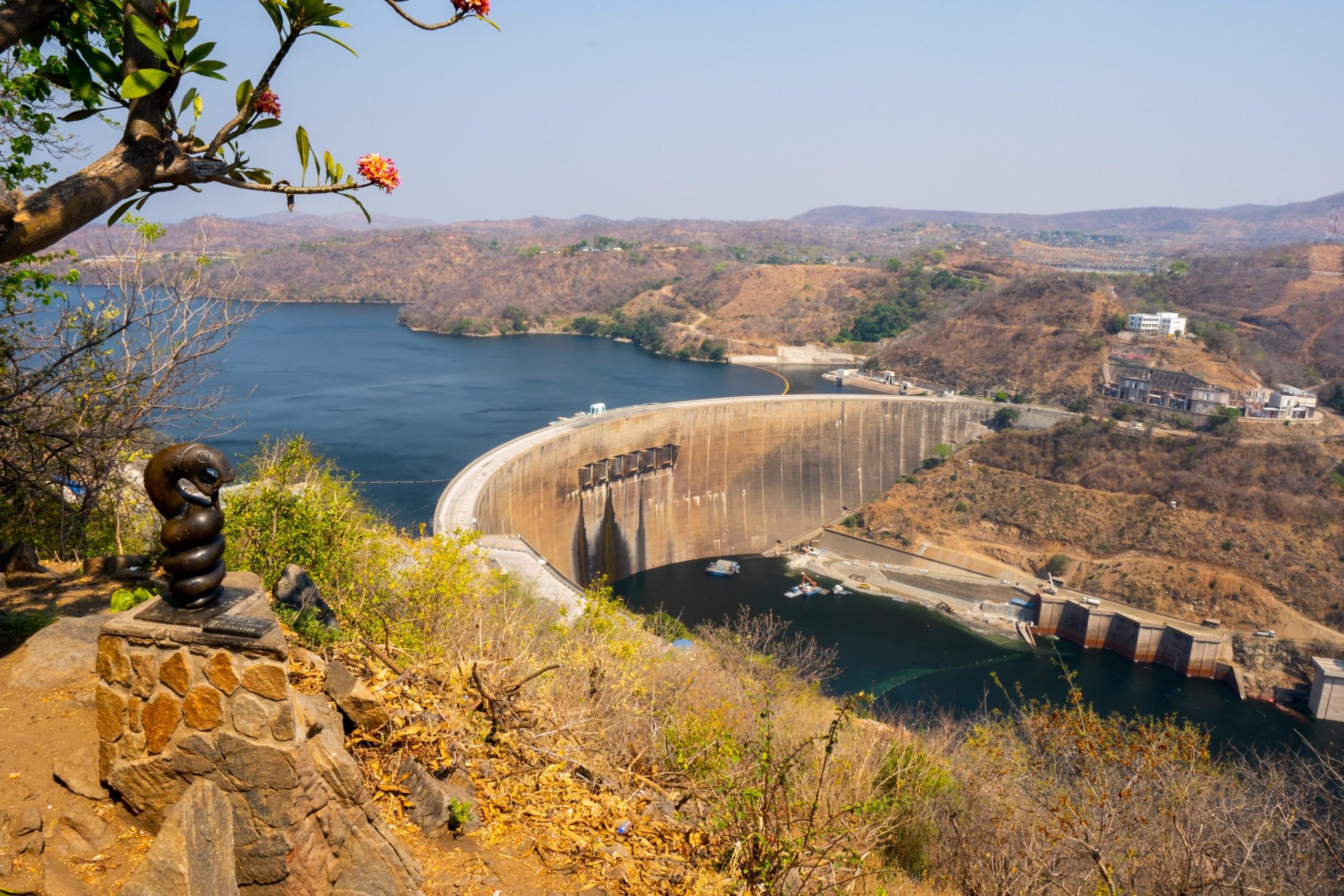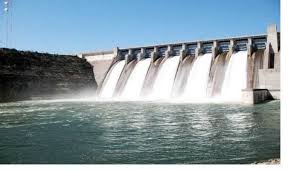Zimbabwe, like many of its regional peers, is grappling with both energy shortages and the impacts of climate change. In response, its government has begun to put investment in new power generation capacity at the centre of its development programme.
In 2021, the government also announced it will cut the country’s carbon emissions by 40% by the year 2050, indicating a shift away from coal – which currently accounts for over a third of electricity generation – towards clean sources.
Zimbabwe’s natural features provide huge potential for renewables. But the rollout of clean energy has so far been slow and problematic.
Given their market-leading role in manufacturing and supplying renewable energy equipment, companies from China – previously a backer of coal in Zimbabwe – are among the actors who could accelerate the country’s transition away from fossil fuels.
Bridging the energy gap
Decades of underinvestment in electricity generation has precipitated years of persistent power shortages in Zimbabwe.
Demand for power has long outstripped installed generation capacity, with the country’s power utility, Zimbabwe Electricity Supply Authority (ZESA), covering the deficit through imports from neighbouring countries. The total installed capacity of ZESA’s five power stations – Munyati, Hwange, Harare and Bulawayo coal power plants, and Kariba hydropower dam – currently stands at just over 2,000 megawatts (MW) against a peak demand of 2,200 MW, though they run well below capacity.
At Hwange, the country’s largest coal power plant, ageing infrastructure has weakened power generation often to below half of its 920 MW capacity. Meanwhile, successive droughts, linked to climate change, mean that the Kariba dam is also often unable to realise its generation potential.
Demand for electricity is rising. A steadily growing population, rapid rural-to-urban migration, and nascent economic recovery from the Covid-19 pandemic – driven by new mining projects for resources including lithium, gold and coal – have spurred demand for power, authorities say.
In an opinion article for Zimbabwe’s Sunday Mail newspaper last year, the country’s President Emmerson Mnangagwa expressed concern at the energy demand, particularly of the mining sector, that is central to the government’s economic policy.
“We… have to increase our internal power generation, possibly threefold, if we are to avoid throttling our growth, and if we are to lessen our dependency on power imports,” wrote Mnangagwa.
Power shortages also threaten the country’s ambitious aspiration of transforming into a middle-income society by 2030.
According to the Ministry of Finance, 41% of Zimbabwe’s population of 14.8 million has access to electricity, with the proportion being around 20% in rural areas.
The government’s medium-term economic programme – the National Development Strategy 1 (NDS1) for 2021–2025 – lays out a target for installed generation capacity of 3,467 MW and construction of 280 km of transmission and distribution lines.
“This energy supply position would mean that there will be no more energy imports by 2025,” reads the NDS1.
Zimbabwe currently imports significant amounts of electricity from its neighbours Zambia, Mozambique and South Africa. This comes at a huge cost to the country, with cash-strapped ZESA reportedly spending US$72.3 million on electricity imports in the first half of 2022.
To plug the deficit, Zimbabwean authorities are exploring a number of interventions. The NDS1 targets the “development of an Integrated Energy Resource Master Plan, completion of ongoing energy projects, as well as construction of new energy generating capacity and upgrading, rehabilitation and maintenance of the existing energy infrastructure.”
There are also plans to boost private sector participation in electricity generation, through the promotion of independent power producers, beyond the six state-run power stations.
Unlike most of its regional peers, however, Zimbabwe’s access to affordable development aid and concessional loans has been curtailed by two decades of Western sanctions, first imposed by the US in 2001. An assessment of the sanctions, done in 2022 by UN special rapporteur Professor Alena Douhan, concluded that they have negatively impacted the country’s economy, including its ability to establish new power generation sources, and the enjoyment of human rights. The assessment detailed challenges in the energy sector that include obsolete technology, poor investment levels, and obstacles to payment transactions and credit access.
A greener energy future
When Cyclone Idai hit Zimbabwe in March 2019 it left a trail of destruction, affecting more than 270,000 people, leaving 341 dead and many others missing. The flooding was made worse by an El Niño drought, itself intensified by warming global temperatures.
For authorities, Idai also signalled the need for a fresh look at the country’s energy policies.
Electricians repairing electrical cables attached to pole
Electricians repair electrical cables destroyed by Cyclone Idai, Ngangu, Chimanimani, Zimbabwe (Image: Alamy)
In 2020, more than 40% of the country’s power was generated from coal. Poor households in the country’s vast rural areas, meanwhile, remain largely dependent on wood for cooking and heating, which puts pressure on forests.
According to a preliminary report on the 2022 national census, 60.7% of households in Zimbabwe use firewood for cooking, while 38.7% use clean energy for their kitchen needs. The remaining 0.6% use coal, charcoal or animal dung, or do not cook.
In the run-up to the COP26 summit, held in Glasgow in 2021, Zimbabwe committed to cutting its carbon emissions by 40% by the year 2050.
In his Sunday Mail opinion piece last July, President Mnangagwa indicated Zimbabwe’s renewables potential. “Our experts estimate that we can generate a further 600 MW from solar, with an additional 120 MW coming from small hydropower projects,” he wrote.
“Potentially, we can also raise 1,000 MW from biomass, with our geothermal energy potential giving us an additional 50 MW… Wind power has a potential to give us 1,872 MW, according to our experts.”
Project announcements in the last year indicate that government experts may have underestimated the country’s potential for solar power generation.
Speaking to China Dialogue, Zimbabwe’s energy minister, Zhemu Soda, emphasised hydropower, as well as on-grid and distributed solar power projects, as central to achieving the country’s climate and energy targets.
Lenin Chisaira, a lawyer and director of the nonprofit Advocates4Earth, was more critical. “Zimbabwe has taken some commendable action on green energy policies, such as the Renewable Energy Policy, Climate Policy and the National Climate Change Response Strategy,” he said. “However, actual implementation has been very slow and problematic.”
He added that implementation of some existing solar projects was opaque.
“Zimbabwe needs to involve knowledgeable stakeholders from green business, environmental groups, universities and academia as well as green energy companies and start-ups in the formulation and implementation of green energy and climate policies,” Chisaira added. “The country must also set up an independent Green Energy Commission.”
Coal contradictions
In spite of its climate pledges and green energy policies, Zimbabwe continues to pursue a number of coal power projects.
RioZim, one of the country’s biggest mining companies, plans to develop a 2,800 MW coal power station in Sengwa, in the north, where massive coal reserves have been discovered.
The US$3 billion project ran into turbulence last year after the proposed financier, the Industrial and Commercial Bank of China (ICBC), withdrew following China’s pledge to end support for coal power plants overseas. RioZim is now scouting for new financiers.
Also in the pipeline is the proposed 2,100 MW Lusulu thermal power project that, according to energy minister Soda, is currently seeking funding.
Further, the Zimbabwean government has secured a US$310 million loan from India’s Export-Import Bank to fund the life extension of six units at the Hwange coal power station by up to 25 years. The project will restore generation to 96% of its 920 MW capacity. Works are expected to commence later this year and be completed by the end of 2028.
From backing coal to backing the transition
China has been a significant player in Zimbabwe’s energy sector. ICBC’s withdrawal from the Sengwa coal power plant project in 2022 was a signal that Chinese overseas investors’ focus had shifted from coal to hydropower and solar.
Along with US-based multinational General Electric, Power China is currently developing the Batoka Gorge hydroelectric plant on the Zambezi River between Zimbabwe and Zambia.
According to Minister Soda, environmental and social impact assessment studies have already been completed for the plant, though not yet for the additional transmission lines, which will be required since the planned generation capacity of the plant was increased from 1,600 MW to 2,400 MW.
According to the Zambezi River Authority, a binational body responsible for the project, feasibility studies have also been completed. Soda said mobilisation of financial resources for the project was underway.
The project could expedite Zimbabwe’s transition away from dependence on coal for power generation, according to Stephen Dihwa, executive director of the coordination centre of the Southern African Power Pool (SAPP), a body that coordinates power systems in the region. He said the Batoka Gorge hydropower station will provide clean energy for both Zimbabwe and neighbouring countries, and will replace a significant amount of power currently derived from coal power plants, thereby reducing national emissions.
The reception is not all positive, however. Kennedy Chigudu, who lives downstream from Batoka in Kariba, the site of another dam, fears development of the power station will negatively impact local tourism, a source of livelihood for many. He noted that, owing to the Covid-19 pandemic, there had been inadequate project consultations with affected communities.
“The developers should come back again for fresh consultations,” he said.
Chinese investors have also shown a growing appetite for solar power projects in the country.
Recently, China Energy Engineering Corporation proposed the construction of a 1,000 MW solar plant at the Kariba dam, at a cost of nearly US$1 billion. Chinese companies have so far signed agreements for solar projects totalling at least 350 MW in capacity, according to a briefing paper by the International Institute of Green Finance at China’s Central University of Finance and Economics.
Chinese firm Yaowei Technology also plans to establish a US$15 million solar panel manufacturing plant in Zimbabwe, to manufacture about 500 solar panels per day.
Golden Kapungu, a lecturer in electrical engineering at the University of Zimbabwe, said the country is underutilising massive potential for alternative energy sources.
“The country has a number of water bodies and some of the best solar radiation belts in the world,” Kapungu said. “There is a need for the government to… adequately invest in this sector. It is not something that can be done overnight, but it can be done and it can save the country revenue and provide the much needed electricity.”
He added that Zimbabwe should take advantage of its close relations with China to inject impetus into its own green transition.
This article was produced as a result of a grant provided by the Africa-China Reporting Project at the Wits Centre for Journalism at the University of the Witwatersrand, Johannesburg, and China Dialogue Trust. The views expressed are the authors.
Source ZmSituation









